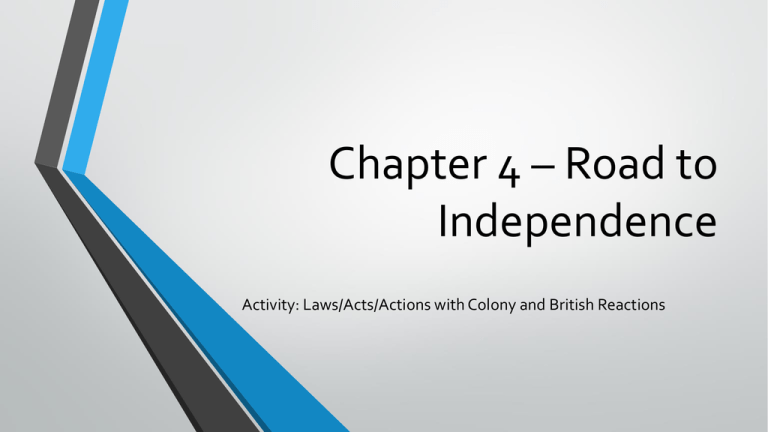Chapter 4 * Road to Independence
advertisement

Chapter 4 – Road to Independence Activity: Laws/Acts/Actions with Colony and British Reactions Stamp Act • The Stamp Act required colonists to purchase special stamped paper for every legal document, license, newspaper, pamphlet, and almanac, and imposed special “stamp duties” on packages of playing cards and dice Colony Reaction Colonists harass stamp distributors, boycott British goods, and prepare a Declaration of Rights and Grievances British Reaction March 1766, Parliament repealed the Stamp Act but issued the Declaratory Act asserting Parliament’s full right to make laws “to bind the colonies and people of America…in all cases whatsoever” Townshend Acts • Indirect tax, or duties levied on imported materials – glass, lead, paint, and paper – as they came into the colonies from Britain Colony Reaction British Reaction Colonists protest “taxation without representation” and organize a new boycott on imported goods June 1768 the British seized the Liberty belonging to John Hancock saying he was smuggling in wine from Maderia and didn’t pay the customs taxes – triggered riots against customs agents Intolerable Acts • Britain tightens control over Massachusetts by closing Boston Harbor and making colonist quarter (house) troops Colony Reaction Colonial leaders form the First continental Congress and draw up a declaration of colonial rights British Reaction Kept Boston, Massachusetts under martial law (military rule) Boston Massacre • British troops stationed in Boston are taunted by an angry mob. The troops fire into the crowd, killing five colonists. Colony Reaction Colonial agitators label the conflict a massacre and publish a dramatic engraving depicting the violence British Reaction King George named a special commission to seek out the suspects and bring them to England for trial for the Massacre incident and burning a boat Tea Act/Boston Tea Party • Britain gives the East India Company special concessions in the colonial tea business and shuts out colonial tea merchants Colony Reaction Colonists in Boston rebel, dumping 18,000 pounds of East India Company tea into Boston harbor British Reaction Passed the Intolerable Acts and putting Boston under martial law Lexington and Concord • General Gage orders troops to march to Concord, Massachusetts, and seize colonial weapons Colony Reaction Minutemen intercept the British and engage in battle – first at Lexington and then at Concord British Reaction British troops continued from Lexington to Concord, but once they reached Concord they were outnumbered – retreated after shots were fired Second Continental Congress • May 1775 – John Adams suggested that each colony set up its own government and that the Congress declare the colonies independent Colony Reaction British Reaction • Colonies continued to get ready for the war • July 1775 – Olive Branch Petition – urging a return to “the former harmony” between Britain and the colonies Britain rejected the Olive Branch Petition and issued a proclamation stating that the colonies were in rebellion and urged Parliament to order a naval blockade of the American coast Declaration of Independence • Thomas Jefferson Wrote • Drew on the concepts of the English philosopher John Locke, who maintained that people enjoy “natural rights” to life, liberty, and property Colony Reaction British Reaction Declared the American colonies were free and on Revolution began, Britain would not give up their July 4, 1776 adopted the Declaration of colonies without a fight Independence Treaty of Paris • September 1783 – confirmed US independence and set the boundaries of the new nation Colony Reaction Now colonist needed to determine the best course of action to set up a new government British Reaction Treaty did not specify when the British would evacuate their American forts – leading to a long road ahead trying to cut ties with Britian

